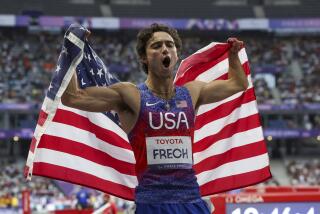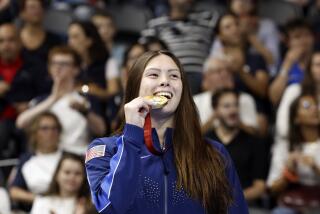After Michael Phelps? U.S. swim team not worried
- Share via
LONDON -- On the first day of the rest of his life, Michael Phelps slept in.
Or, at least, he tried to. He got four hours of sleep, his body still attuned to early-morning training sessions. For the first time since he arrived here two weeks ago, he saw Big Ben. He still had a sponsor to satisfy, so he threw on a Visa polo shirt and entertained questions from reporters from Australia, Brazil, Colombia, the United Arab Emirates, Nigeria and Turkey.
Without Phelps, who retires as the most decorated Olympic athlete of all time, can the rest of the world catch the United States in swimming?
“We pride ourselves in being the best swimming team in the world,” Phelps said Sunday. “We’re going to keep that.”
The United States won 30 swimming medals in London, one shy of the total four years ago but almost three times as many as any other country. Japan finished second with 11 medals, followed by Australia and China with 10 each.
The U.S. has won the most swimming medals in all but two Olympics since 1960. The East Germans won those two — the U.S. boycotted one of them — and that country has since gone out of business.
Phelps might be more popular abroad than he is at home, given the international media horde that flocked to see him at a London conference center on Sunday. He has inspired a generation of swimmers around the world, including 20-year-old Chad le Clos of South Africa, who beat Phelps in the 200-meter butterfly here and might succeed him as the world’s most versatile swimmer.
“I watched all his races a million times,” Le Clos said.
Australia will fortify itself after a national calamity here, with 21-year-old sprint star James Magnussen proclaiming he felt “bulletproof” and then failing to win the gold in the 100 freestyle. The Australian women fared well, with Alicia Coutts winning five medals, tying Americans Missy Franklin and Allison Schmitt for the most among women.
China bolstered its credentials as a rapidly emerging power, with 16-year-old Ye Shiwen setting a world record in the women’s 400-meter individual medley and an Olympic record in the 200 IM and Sun Yang setting a world record in the men’s 1,500 free and an Olympic record in the 400 free.
Phelps won six medals here, more than any other swimmer. However, the American depth is so great that there might not be a post-Phelps dropoff. The U.S. can enter only two swimmers in each Olympic event.
In the 400 IM, Tyler Clary had the third-best time in the world this year coming into the meet. He did not make the U.S. team in that event, because Phelps and Ryan Lochte ranked 1-2, however, Clary did win gold in the 200 backstroke.
In the 100 fly, Lochte had the fourth-best time, even after he withdrew from the final at the U.S. Olympic trials. Phelps and Tyler McGill ranked 1-2.
In addition, the U.S. women unveiled a new starring cast, replacing the likes of Natalie Coughlin and Amanda Beard with the fresh faces of 17-year-old Franklin, who set a world record in the 200 back, and the 15-year-old Katie Ledecky, who set an American record in the 800 free.
Rebecca Soni set a world record in the 200 breaststroke; Dana Vollmer did the same in the 100 butterfly.
The key to the U.S. hopes in Rio de Janeiro could be Lochte, who inherits the Phelps role as the most prominent American multi-event swimmer. Lochte entered six events here and won two. At 28, he is one year older than the retiring Phelps.
“He’s a big boy,” said Gregg Troy, the coach for Lochte. “It’s athletics. He’ll be fine. It’s just swimming. He’ll come back and he’ll go on. It’s not the last meet. He’s not planning on retiring.”
Lochte is planning on moving to Los Angeles from Florida, where he had continued to live and train with Troy even after graduating from the University of Florida six years go.
Troy, who also served as the U.S. men’s coach here, already is looking forward to Rio.
“I feel real comfortable,” Troy said. “We’re going to be real good four years from now.”
Nathan Adrian, 23, who won gold in the 100 free and swam the final lap of the relay that served as Phelps’ farewell race, said the new generation can more than take over for Phelps, even if no one swimmer cannot duplicate his feats.
“We had some great swims out of some young rookie swimmers,” Adrian said. “They’re itching to fill the shoes he is leaving behind. By no means is anyone trying to take over his role, but just fill in the gaps.”
Vollmer, 24, who won three gold medals, was not quite as subtle about it.
“I’m in awe of what U.S. swimming is going to have to offer for many years to come,” Vollmer said.
twitter.com/BillShaikin
More to Read
Go beyond the scoreboard
Get the latest on L.A.'s teams in the daily Sports Report newsletter.
You may occasionally receive promotional content from the Los Angeles Times.







